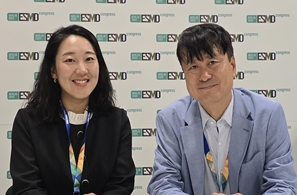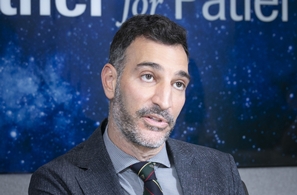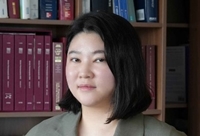- How has Leqembi changed the clinical site in 6 months?
- by Moon, sung-ho | translator Alice Kang | May 14, 2025 06:09am
In response, experts are evaluating the therapeutic effects and side effects of Leqembi (lecanemab, Eisai Korea) while demanding improvements to the health insurance reimbursement system in various areas, such as testing costs.
At the same time, they are expressing anticipation for other new dementia drugs from global pharmaceutical companies that are likely to be introduced in Korea. The introduction of just one new global drug has changed the atmosphere on-site and in academic activities.

Leqembi is a new treatment that removes amyloid beta (Aβ), one of the main causative substances of Alzheimer's disease. It specifically binds to soluble amyloid beta protofibrils and insoluble amyloid beta fibrils—the most toxic forms of amyloid beta—to reduce amyloid beta plaques in the brain.
In particular, it is the first antibody therapy to receive full approval from the FDA in July 2023 for its efficacy and safety in delaying the progression of Alzheimer's disease and cognitive decline by removing the causative agent. In Korea, it was approved by the MFDS in May last year and has been prescribed in general hospitals since the end of November.
However, there are limitations in that it can only be used in medical institutions that meet certain standards, as it requires collaboration with radiologists, neurologists, or other specialists to assess amyloid-related imaging abnormalities (ARIA) such as cerebral vascular lesions and cerebral hemorrhage, as well as facilities capable of administering Leqembi intravenously every 2 weeks and personnel to monitor adverse drug reactions.
Nevertheless, Lecanemab is being rapidly adopted and utilized on-site not only at university hospitals but also at regional hub general hospitals, due to the disease's characteristic lack of a fundamental cure.
According to an internal evaluation by the Korean Dementia Association, approximately 700 cases have been treated using the medication 6 months after its introduction in Korea.
Seong Hye Choi, president of the Korean Dementia Association (Department of Neurology, Inha University Hospital), stated, “A patient weighing 50kg bears approximately KRW 1 million for a single administration of Leqembi. Considering that it is administered every 2 weeks, this amounts to KRW 2 million per month, and KRW 24 million per year for the patient. For a 40kg patient, the cost per administration is approximately KRW 800,000. Some patients are covered with indemnity insurance, and the treatment being well received onsite, even better than expectations.”
Additionally, in clinical settings, there is a projection that the incidence of adverse reactions related to brain edema, particularly ARIA, observed during MRI scans in the course of Leqembi’s introduction may be relatively lower than what was shown in clinical studies.
Kee Hyung Park, Chair of the Strategy and Planning Committee (Department of Neurology, Gachon University Gil Medical Center), said, “Japan introduced Leqembi before South Korea, and the drug is being actively used as it is covered by reimbursement. Among approximately 8,000 cases, ARIA occurred in 537 cases, which is 6.7% of all patients.” He added, “During the initial clinical trials, the incidence rate of ARIA was reported to be between 12% and 17%.”
Park added, “In Korea, there have been no cases of patients experiencing severe side effects after receiving Leqembi. While it is still too early to draw definitive conclusions, it is reasonable to expect that side effects may be less common in Asians compared to Westerners.
Amidst this, doctors have suggested that reimbursement for Leqembi itself is necessary, but that reimbursement for tests such as MRI is more urgent.
Currently, MRI tests are required to assess cerebral vascular lesions and ARIA in patients receiving Leqembi. The logic is that tests that bring less health insurance burden should be reimbursed first, followed by a discussion on reimbursement for the drug itself.
Choi said, “According to MFDS guidelines, patients receiving Leqembi must undergo MRI scans. This means that MRI scans must be performed before the fifth, seventh, and fourteenth injections. If reimbursement is applied to this part of the treatment, it will be able to somewhat reduce the burden on patients.”
Choi also pointed out that long-term support for the costs of injection rooms and dedicated nurses (coordinators) provided for severe cancer patients is also necessary for dementia.
Recently, Ewha Womans University Mokdong Hospital and Ewha Womans University Seoul Hospital introduced dedicated nurses following the adoption of Leqembi, but many medical institutions find it difficult to operate such programs due to the burden of labor costs.
Jee Hyang Jeong of the Department of Neurology at Ewha Womans University Seoul Hospital (Chair, Public Relations Committee, KDA) explained, “When patients and their families request Leqembi treatment, it is necessary to provide detailed explanations about the treatment process, side effects, MRI scans, and other related matters. This entire process typically takes 30 to 40 minutes. We recognize this as a critically important process and have begun operating with dedicated staff internally. This was a big and dedicated decision on the hospital’s part.”
Jeong added, “Ultimately, dementia is similar to cancer. We need to hire dementia specialists to educate patients and their families. The same applies to infusion rooms. Comprehensive improvements are needed, including reimbursement for the use of infusion rooms and labor costs, similar to cancer treatment.”
Following the use of Leqembi on-site, expectations are also rising for another new dementia drug, Lilly's Kisunla (donanemab).
Lilly's Kisunla cleared the regulatory hurdle - FDA - last year. Kisunla demonstrated efficacy in delaying cognitive decline in patients with early-stage Alzheimer's disease in the Phase III TRAILBLAZER-ALZ2 study. In the clinical trial, it delayed cognitive decline regardless of the disease's progression or pathological stage.
Particularly, compared to Leqembi, it is evaluated as having a high potential for utilization in Korea due to improved convenience in patient administration.
Choi said, “Kisunla has the advantage of a relatively long administration cycle and the possibility of discontinuing treatment midway through the course. I understand that Lilly, the manufacturer of Kisunla, is in discussions with the MFDS for its introduction in Korea. With mixed results in global markets, I expect the MFDS to make a decision based on the domestic situation.”
Park also noted, “Rather than focusing on why approval was granted in the U.S. but not in Europe, we should examine the characteristics of the drug and its differences from existing medications. We need to assess this and consider how patients can individually select the appropriate medication for treatment when approval is granted domestically.”
-

- 0
댓글 운영방식은
댓글은 실명게재와 익명게재 방식이 있으며, 실명은 이름과 아이디가 노출됩니다. 익명은 필명으로 등록 가능하며, 대댓글은 익명으로 등록 가능합니다.
댓글 노출방식은
댓글 명예자문위원(팜-코니언-필기모양 아이콘)으로 위촉된 데일리팜 회원의 댓글은 ‘게시판형 보기’와 ’펼쳐보기형’ 리스트에서 항상 최상단에 노출됩니다. 새로운 댓글을 올리는 일반회원은 ‘게시판형’과 ‘펼쳐보기형’ 모두 팜코니언 회원이 쓴 댓글의 하단에 실시간 노출됩니다.
댓글의 삭제 기준은
다음의 경우 사전 통보없이 삭제하고 아이디 이용정지 또는 영구 가입제한이 될 수도 있습니다.
-
저작권·인격권 등 타인의 권리를 침해하는 경우
상용 프로그램의 등록과 게재, 배포를 안내하는 게시물
타인 또는 제3자의 저작권 및 기타 권리를 침해한 내용을 담은 게시물
-
근거 없는 비방·명예를 훼손하는 게시물
특정 이용자 및 개인에 대한 인신 공격적인 내용의 글 및 직접적인 욕설이 사용된 경우
특정 지역 및 종교간의 감정대립을 조장하는 내용
사실 확인이 안된 소문을 유포 시키는 경우
욕설과 비어, 속어를 담은 내용
정당법 및 공직선거법, 관계 법령에 저촉되는 경우(선관위 요청 시 즉시 삭제)
특정 지역이나 단체를 비하하는 경우
특정인의 명예를 훼손하여 해당인이 삭제를 요청하는 경우
특정인의 개인정보(주민등록번호, 전화, 상세주소 등)를 무단으로 게시하는 경우
타인의 ID 혹은 닉네임을 도용하는 경우
-
게시판 특성상 제한되는 내용
서비스 주제와 맞지 않는 내용의 글을 게재한 경우
동일 내용의 연속 게재 및 여러 기사에 중복 게재한 경우
부분적으로 변경하여 반복 게재하는 경우도 포함
제목과 관련 없는 내용의 게시물, 제목과 본문이 무관한 경우
돈벌기 및 직·간접 상업적 목적의 내용이 포함된 게시물
게시물 읽기 유도 등을 위해 내용과 무관한 제목을 사용한 경우
-
수사기관 등의 공식적인 요청이 있는 경우
-
기타사항
각 서비스의 필요성에 따라 미리 공지한 경우
기타 법률에 저촉되는 정보 게재를 목적으로 할 경우
기타 원만한 운영을 위해 운영자가 필요하다고 판단되는 내용
-
사실 관계 확인 후 삭제
저작권자로부터 허락받지 않은 내용을 무단 게재, 복제, 배포하는 경우
타인의 초상권을 침해하거나 개인정보를 유출하는 경우
당사에 제공한 이용자의 정보가 허위인 경우 (타인의 ID, 비밀번호 도용 등)
※이상의 내용중 일부 사항에 적용될 경우 이용약관 및 관련 법률에 의해 제재를 받으실 수도 있으며, 민·형사상 처벌을 받을 수도 있습니다.
※위에 명시되지 않은 내용이더라도 불법적인 내용으로 판단되거나 데일리팜 서비스에 바람직하지 않다고 판단되는 경우는 선 조치 이후 본 관리 기준을 수정 공시하겠습니다.
※기타 문의 사항은 데일리팜 운영자에게 연락주십시오. 메일 주소는 dailypharm@dailypharm.com입니다.









